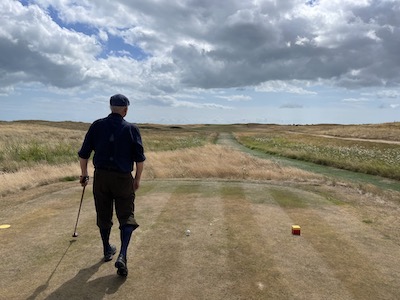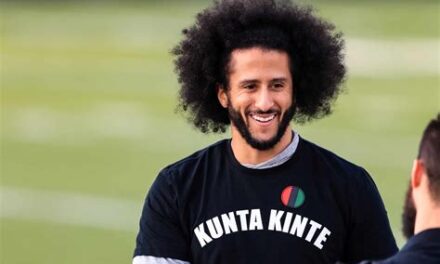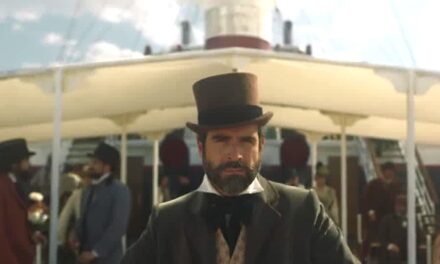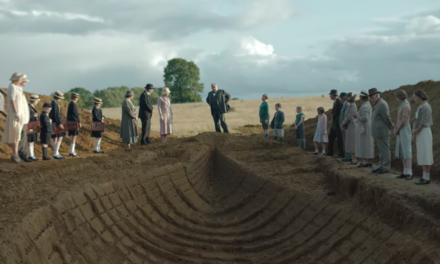Golf prepared me for manhood. My Dad made sure of it. “This is my son, the gorilla,” he would say to his buddies on the first tee of Ridglea Country Club in Ft. Worth. “He can hit it a hundred miles.” For a kid of 12 or 13, that’s plenty of pressure.
So in the early-morning dew, I would set my feet on the grass and address the ball. The familiar “dollar, dollar, dollar” bantering would grow silent and all the eyes would turn to me.
“Jesus,” I thought, “just let me hit it solid, somewhere. Anywhere!”
I’m older now, and I realize everyone was rooting for me then, hoping I could fulfill my Dad’s expectations. Every now and then I would look up after my swing to see the ball arching its way toward the middle of the fairway, safe from the traps on the right and the out-of-bounds down the left side.
But more often, the result of my nervous backswing would be a dribble into the first cut of the rough or a pop-up that would barely make it onto the first few yards of the fairway. My Dad and his friends would pretend not to notice my shame. In time, I learned to assume the same poker face, to ignore the mistakes that threaten to infect future swings.
After the dribble or pop-up, I recall getting really good at hitting 260-yard 3-woods to within short-iron distance of the first green. I always noticed how these prodigious second shots would quickly revive the spirit of our foursome, as if the grown-ups wanted to be assured that they really had a “gorilla” in their midst.
But Dad wouldn’t stop there. He liked putting pressure on me as much as he liked me to succeed. As a former World War II bomber captain and airline pilot, Dad wasn’t affected by pressure. In fact, he seemed to thrive on it. The more important the putt, the more likely he would make it. He seemed to suddenly wake up, all his senses and energy would focus on the one task, and the ball would rattle in the bottom of the cup.
I always thought he put pressure on me simply to help me grow up. There were times it made me angry, and there were times it kept me from playing good golf. Dad and I would come home from the course and my mother would take one look at my face and say, “He got to you today, didn’t he?”
“Yes, he had,” I thought, but I never admitted it.
I was nearly 50 when I now realized something perhaps Dad didn’t even know at the time. Pressure is not necessarily the enemy of golf (or life) but can be its friend. That’s the lesson I learned from watching Dad hole all those 20-footers to win a $3 nassau. He made pressure into a kind of inspiration, a spirit — pressure became his good daimon.
My Dad was no philosopher; he couldn’t explain to me what happened, or how he did it. Like the cowboy stars of old, he could only show, not tell. But I’m glad I eventually figured it out for myself, although it took me a long time. I should have know those father-son antics on the golf course had deeper soundings.
A few times he asked me if I wanted to become a professional golfer, but I had other, more intellectual, aspirations. Dad watched in despair as I traced my route through graduate school to university teaching, and then, much to his relief, into the publishing business.
During my 15 years of teaching philosophy, golf was just about the only thing my Dad and I had in common. Golf kept us friends. As every golfer knows, if you take your personal differences, your financial or marital troubles out on the course, you might as well not be there. So, for 20 years we could talk and laugh on the golf course, even if we were barely speaking after we got off it.
Over the years the tables slowly turned between Dad and me. I learned to handle the pressure, and would often discover his knack for inspiration. We often played his course in Houston, the venerable Champions, owned and run by the champion Jack Burke, Jr., a philosopher of golf if there ever was one. And every summer we teamed up to play in the member-guest at the country club in Rockland, Maine.
Two summers before he passed away, my Dad, who was in his 70s and still played to a 12, had an attack of nerves. It was the first time I had ever seen him routinely miss 2- and 3-foot putts. The only time he had ever missed short putts before was when he was fooling around, never in competition. For the first time in our golfing history, it was my short game keeping us in contention. We had come full circle; we both knew it, but we didn’t talk about it. Men just don’t.
After that match, I realized we had become better friends, because of his missed putts. Golfers often curse and complain that the game exposes everything about you, that golf leaves you nowhere to hide. We had received a blessing in the naked moment of those missed putts. It was almost the final chapter of how golf had make us known to each other: a son’s youth to his father, a father’s age to his son. And, because of this, we not only stayed friends, we became better ones.
I went back to Ridglea Country Club in Ft. Worth after my father’s passing just to take a quick look at the place where I learned to play golf. I noticed the first tee had been moved to the right so it faced directly at both the traps down the right side of the fairway and the out-of-bounds on the left. I thought of all those nervous teenagers teeing off with their dads who must be finding it even harder to hit the fairway than I did.














